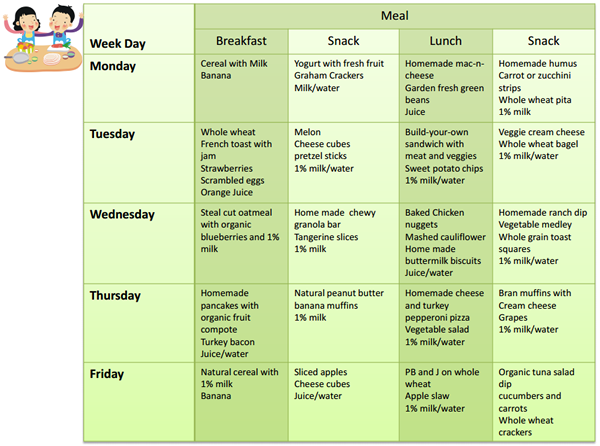Lesson 12: Menu Planning and Safe Food Handling
Attention

Learning Outcomes
Upon completion of this lesson's material, students will be able
- Demonstrate knowledge of basic safe food handling procedures
- Discuss communicating with families about food
- Explain allergic reactions and how to handle them
- Demonstrate understanding of considerations for menu planning in child care centers
Teaching
Read Chapter 9 SNH
There are many things to consider when planning a menu for young children. If you subscribe to a reimbursement program through the state or federal government, such as the CACFP, (Child and Adult Care Food Program), you need to plan foods that meet the nutritional requirements to qualify. The amount of food you will purchase may depend on the number and ages of the children in your care. (https://www.naeyc.org/files/yc/file/200403/ObesityNutrition.pdf)
When working with families, you may want to have a conversation around cultural values and food. It will be your decision whether you adopt the child’s home food preferences or require the child to eat what you provide. However, it is always best practice to work together with families so they feel comfortable leaving their child in your care. Decisions should always be based on what is best for the child.
In order to provide high quality meals for a reasonable price, you should shop current sales and use produce that is in season. It is a good idea to be familiar with different ways to cook in order to allow you more flexibility in the types of food that you offer. Don’t be afraid to take a cooking class through your local Adult Ed or Cooperative Extension programs.
Also remember, that even though you may not care for a certain type of food, the children might like it. If it’s a healthy choice, then you should offer it. And using children’s books to teach about trying and tasting healthy foods is always a good idea.
Check out this book titled: “Don’t Yuk My Yum”.
https://www.amazon.com/DONT-YUCK-YUM-Amy-Pleimling-ebook/dp/B00HNJWXTW.
Provide a weekly menu to parents. This way families are aware of what their child is eating as they plan their home meals and they can alert you to any potential issues with certain foods.
You will also need to know if a child in your care has a food allergy. Food allergies are on the rise, and some are deadly. Allergic reactions can range from skin rashes to stomach aches to full anaphylactic shock. Common allergy triggers are nuts, berries, milk, eggs, and shellfish. It is vital that you know if a child in your care has a known allergy. But since children are young and some foods may be new, you could be the first person to witness a reaction. It is a good idea to know what foods a child has already eaten and what is new and to be familiar with the signs of an allergic reaction and how to respond.
If a child has an Epipen, you should be formally instructed on how to use it and should have one for your center. The Epipen should be stored in an area that is easy for you to get to in an emergency, but out of reach of children.
Prepackaged foods may contain ingredients that you are not aware of. When purchasing these items, be careful to read the label if you have a child who has an allergy. And don’t forget to eliminate foods that trigger allergies from art activities if there is a known issue. In many instances there are easy replacements for food that is needed, such as replacing peanut butter with sunflower butter. You may also need to carefully monitor foods or items that are brought in from other children’s homes.
Beyond menu planning, you should also know how to safely handle food. Proper hand washing is a must! Please see table 9-4 of your text for more specific information. Some of these items should be included on your Health & Safety checklist as well. And don’t forget to teach your children how to wash their hands, as we discussed in a previous lesson.
Please note the required refrigerator and freezer temperatures. The State of Maine Rules of the Licensing of Child Care Facilities requires the maintenance of proper temperatures and the licensing agent will check this upon inspection. You should be familiar with these procedures so that you can keep the children in your care safe and healthy.
Assessment
Lesson 12 Quiz
Lesson Quizzes will consist of material from the lesson, the discussions, and from assigned reading. Questions will be True/False, Multiple Choice, and Short Answer. Be sure to review all the Lesson and Reading material prior to starting this quiz.
Lesson 12 Discussion
You have a new child in your care. Mom tells you that their family is vegetarian and the child does not eat meat or drink milk. It is a personal preference, not a medical requirement. How do you handle this? Will you provide an alternative menu and foods or require the parent to provide food? Will you tell the family that the child will have to eat what you provide and you will not alter the menu?